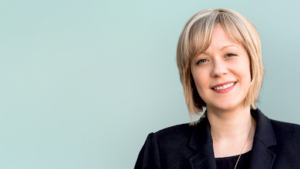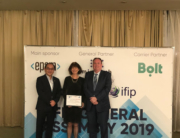Amanda Randles Receives 2023 ACM Prize in Computing
 ACM has named Amanda Randles the recipient of the 2023 ACM Prize in Computing for her ground-breaking contributions to computational health through innovative algorithms, tools, and high-performance computing methods for diagnosing and treating a variety of human diseases.
ACM has named Amanda Randles the recipient of the 2023 ACM Prize in Computing for her ground-breaking contributions to computational health through innovative algorithms, tools, and high-performance computing methods for diagnosing and treating a variety of human diseases.
Randles is the Alfred Winborne and Victoria Stover Mordecai Associate Professor of Biomedical Sciences at Duke University. She is known for developing new computational tools to harness the world’s most powerful supercomputers to create highly precise simulations of biophysical processes. Her early work included creating accurate 3D simulations of how blood flows through the circulatory system. More recently, she and her team developed biomedical simulations that yield direct and concrete impacts on patient care, including simulations of 700,000 heart beats (the previous state-of-the-art was of 30 heart beats), the interaction of millions of cells, and cancer cells moving through the body.
The ACM Prize in Computing recognises early-to-mid-career computer scientists whose research contributions have fundamental impact and broad implications. The award carries a prize of $250,000, from an endowment provided by Infosys Ltd.
Featured ACM Member: Lauren Wilcox
 Lauren Wilcox is a Senior Director and Distinguished Applied Scientist at eBay, where she leads eBay’s Office of Responsible AI. Wilcox has held research and organizational leadership roles in both industry and academia. At Google Research, she was a senior staff research scientist and group manager of the Technology, AI, Society & Culture (TASC) team, advancing work to understand and shape the sociotechnical factors that surround machine learning development and the effects AI/ML has on impacted communities.
Lauren Wilcox is a Senior Director and Distinguished Applied Scientist at eBay, where she leads eBay’s Office of Responsible AI. Wilcox has held research and organizational leadership roles in both industry and academia. At Google Research, she was a senior staff research scientist and group manager of the Technology, AI, Society & Culture (TASC) team, advancing work to understand and shape the sociotechnical factors that surround machine learning development and the effects AI/ML has on impacted communities.
In her interview, Wilcox discusses her role at eBay, making sure that AI is both technically sound and “societally robust,” an important area at the intersection of AI and society that hasn’t received enough attention, and more.
Featured ACM Member: Gérard G. Medioni
 Gérard G. Medioni is a Vice President and Distinguished Scientist at Amazon. He is also an Emeritus Professor of Computer Science at the University of Southern California, where he served as Chairman of the Computer Science Department from 2001 to 2007. Medioni, whose research interests span a broad spectrum of the image understanding field, joined Amazon in 2014 to help create Just Walk Out technology, a system which employs cameras and sensors to allow customers to take the items they want from shelves and leave a store without waiting in line to check out. More recently, he helped create the identity service Amazon One, a convenient, contactless way for people to use the palm of their hand for payment, age verification, loyalty, entry and more.
Gérard G. Medioni is a Vice President and Distinguished Scientist at Amazon. He is also an Emeritus Professor of Computer Science at the University of Southern California, where he served as Chairman of the Computer Science Department from 2001 to 2007. Medioni, whose research interests span a broad spectrum of the image understanding field, joined Amazon in 2014 to help create Just Walk Out technology, a system which employs cameras and sensors to allow customers to take the items they want from shelves and leave a store without waiting in line to check out. More recently, he helped create the identity service Amazon One, a convenient, contactless way for people to use the palm of their hand for payment, age verification, loyalty, entry and more.
In his interview, he discusses early computer vision work, the most transformative recent innovation in computer vision/image understanding, promising computer vision technology which employs deep learning to help the visually impaired, and more.
Read Medioni’s interview here.
ACM ByteCast: Rosalind Picard
 In this episode of ACM ByteCast, guest host Scott Hanselman welcomes ACM Fellow Rosalind Picard, a scientist, inventor, engineer, and faculty member of MIT’s Media Lab, where she is also Founder and Director of the Affective Computing Research Group. She is the author of the book Affective Computing, and has founded several companies in the space of affective computing, including the startups Affectiva and Empatica, Inc. A named inventor on more than 100 patents, Picard is a member of the National Academy of Engineering and a Fellow of the National Academy of Inventors.
In this episode of ACM ByteCast, guest host Scott Hanselman welcomes ACM Fellow Rosalind Picard, a scientist, inventor, engineer, and faculty member of MIT’s Media Lab, where she is also Founder and Director of the Affective Computing Research Group. She is the author of the book Affective Computing, and has founded several companies in the space of affective computing, including the startups Affectiva and Empatica, Inc. A named inventor on more than 100 patents, Picard is a member of the National Academy of Engineering and a Fellow of the National Academy of Inventors.
Here, she talks about her work with the Affective Computing Research Group, clarifies the meaning of “affective” in the context of her research, discusses how her training as an electrical with a background in computer architecture and signal processing drew her to studying emotions and health indicators. Picard also talks about the importance of data accuracy, the implications of machine learning and language models to her field, and privacy and consent when it comes to reading into people’s emotional states.
Visit the ByteCast archive here.
ACM TechTalk: Titus Winters
 Register for the next free ACM TechTalk, “Design Is Testability,” presented on Wednesday, May 8 at 1:00 pm ET/5:00 UTC by Titus Winters, Senior Principal Scientist at Adobe.
Register for the next free ACM TechTalk, “Design Is Testability,” presented on Wednesday, May 8 at 1:00 pm ET/5:00 UTC by Titus Winters, Senior Principal Scientist at Adobe.
For Software Engineering practitioners, the past 10 years have seen an explosive rise in the adoption of continuous integration systems and automated software testing. Having sufficient test coverage is now considered key to maintaining enough control of large software systems to make changes quickly and reliably. Although we’ve started to write tests, there is still a lot to learn about how to test well. With 40 years of invention and innovation in test strategies and technologies, it’s hard to know what tools are appropriate when testing a given interface. Even among industry leaders, a lot of good testing is still a matter of “I’ll know it when I see it.” In this talk Winters argues that long-ignored concepts from software design are essential in understanding how to test appropriately. Along the way he’ll tie together ideas and technologies from both design and testing: control, contracts, and design qualities help us understand how best to us unit tests, dynamic analysis, fuzzing, and property-based testing approaches.
Featured ACM Distinguished Speaker: Latifur Kahn
 Latifur Khan is currently a full Professor (tenured) in the Computer Science Department at the University of Texas at Dallas, USA, where he has been teaching and conducting research since September 2000. He received his PhD degree in Computer Science from the University of Southern California (USC) in August of 2000.
Latifur Khan is currently a full Professor (tenured) in the Computer Science Department at the University of Texas at Dallas, USA, where he has been teaching and conducting research since September 2000. He received his PhD degree in Computer Science from the University of Southern California (USC) in August of 2000.
Khan is an ACM Distinguished Member and received IEEE Big Data Security Senior Research Award. He has received prestigious awards including the IEEE Technical Achievement Award for Intelligence and Security Informatics and IBM Faculty Award (research) 2016. Recently, he has become a Fellow of British Computer Society (BCS), and Institution of Engineering and Technology (IET).His lectures include “Automating Vulnerability Detection and Prevention in Smart Contracts,” “Big Data Stream Analytics & Its Applications,” “Data to Knowledge: Modernizing Political Event Data for Big Data Social Science,” and more. He is available to speak through the ACM Distinguished Speaker Program.
For more information about Khan, please visit his DSP speaker information page.





